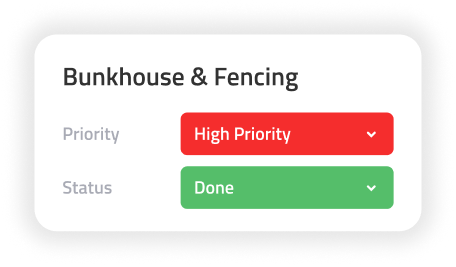ECONOMIC EXPERTS PREDICTED a recession was just around the corner. If that were true, COVID-19 would surely speed things up. Although the construction industry is not in the economic storm’s direct path, it is certainly feeling its effects. While in some cities, construction has been considered “essential business,” in others, projects are being delayed or canceled. No matter the cause, to ensure that your company will survive a recession in construction, you need to start planning now.
According to the Associated Builders and Contractors, regardless of the ongoing downturn, contractors report they’re busier than ever and enjoy near-record backlogs. Then again, speculation arises that the lack of skilled workers caused a project logjam that disguises the reality.

I don’t think you can ever recession-proof anybody in this business, but there are certainly ways to be smart — ways to plan and not to be taken by surprise,
Jack Callahan, a construction industry leader at financial consultancy firm Cohn Reznick LLP
Recalling the Great Recession, several contractors were forced out of business by not taking the proper precautions. In this time and age, being a contractor during a recession means you must have specific measures to consider minimizing the negative effect of a recession on your business, no matter the economic landscape.
MONITOR CASH FLOW AND KEEP TABS ON PROJECT CHANGES!
During a recession, money seems to get highly scarce. Contractors get in trouble when it’s challenging to pay for your materials and labor when you’re not paid by the project’s owner or general contractor. As contractors, you need to ensure that the ultimate funding for your projects is secure and with no issues that would keep an owner from paying their bills on time. When the owner does not provide that information within the time stated in the contract, contractors don’t have to start work — or can stop it — and bill for delay-related costs.
Now is also the time to get your financing in order. This includes going after a line of credit before you need it. As business owners, you should take the time to reevaluate your current loans and, even though it’s early, categorize them so that you can preserve working capital if the industry takes a hit. Extending a loan or negotiating new terms will be more difficult if banks tighten their lending policies in response to the economic downturn.
Businesses should be raising cash, determining if their lines of credit are large enough, considering staffing models, and ensuring the good graces of bankers and insurers.” Anirban Basu, chief economist of the Associated Builders and Contractors
A contractor should take time to set rules around project updates if they aren’t in place already. Send invoice reminders for unpaid billings the week before the project’s next progress billing is due. Reminding them of any “late fees” incurred if not paid on time is also helpful. Real-time reports are the best way contractors can react and make necessary adjustments to their operations. It can become problematic if a contractor is not getting regular job cost reports.
Additionally, smaller contractors should have a construction accounting professional to turn to for timely, up-to-date information about the financial state of the businesses. A recession can impact progress payments from your ongoing jobs. When the job is halted, everything stops. Not just the work on the project but the funding as well. During a recession, project funding can disappear overnight. It’s not uncommon for projects, especially large or expensive ones, to get shelved indefinitely until the economy improves again.
DON’T RELY ON BACKLOGS! LOOK FOR OPPORTUNITIES TO DIVERSIFY SERVICES.
If you rely on your backlogs, you may find yourself suddenly without any work. A recession in the construction industry means projects can be put on hold indefinitely or canceled altogether. Rather than place all your hopes in backlogs, create a strategic outline and use advanced technology to uphold work during a downturn.
This recession differs from the Great Recession over a decade ago, and construction work is now considered “essential workers.” Consumer demand changes during a recession and one way to respond to those shifts are to focus on services or projects for which there is a need. For example, consumers are more likely to repair than replace during a recession, which means opportunities for maintenance will be more prevalent than those for new builds. While maintenance may not be the most natural next step for your line of work, it is better to identify and pursue customer needs that your business can fulfill.
Taking care of backlogs will help clear your headspace. It will enable you to see possibilities and even have a contingency plan with reasonable solutions to help you through a crisis as huge as an economic downturn. Before jumping on to a new project, checking for pending backlogs that need to be marked off your to-do list is important. Construction management software does not let scarce resources get in the way of operating your business. It helps you work faster and more efficiently, making it easier to clear out backlogs to progress faster with your tasks and onward with the next projects.
MASSIVE LAYOFF IS NOT A SOLUTION. KEEP HOLD OF YOUR BEST EMPLOYEES!
One obvious thing a contractor reluctantly thinks is that: ‘the best employees are often the best paid,’ which means that to reduce overhead costs, one assumes the only way to survive is to lay off manpower. The problem with this approach is that good help is so hard to find in the construction industry. You must rely on your team to help your construction business stay flexible, pivot, and think creatively during a recession.
When things are tough, remember you can’t do this alone, you need to depend on your workforce. Inflation is at its highest in 40 years, indicating the things that your money can afford are slowly becoming more expensive. To avoid key workers jumping ship for higher earnings, it’s essential to talk to them and see where their heads are at. Investing in your employees helps them feel more connected to you and the business, and they will be more willing to go the extra mile when they are called on to do so. This may seem insensitive initially, but it is the right way to go. This way, you still have the best crew available when a project comes along. Focus your efforts on keeping your best workers happy, so you have reliable help during an economic downturn.
It is important to remember that each recession is different. When you find your construction business is struggling or having issues, a recession will only worsen things. Those mentioned above are just a few helpful ways a construction business can thrive during a recession. Now is the time to monitor your cash flow, create job costing systems, increase project productivity, and improve how efficiently things are done. This should give you a good place to start planning to keep your business running.
Good things to keep in mind are what services people need during this kind of crisis and those considered essential, especially to the government. Getting the right construction software for your business helps you learn project inefficiencies with useful information to help you think of efficient solutions before an economic downturn finally occurs. Construction management software can be a huge help as it allows you to digitize workflow and add layers of automation on top so you can have a tightly tuned machine running in the background that allows you to make hard decisions at any given moment without the need to panic.
In addition, keep in mind that your employees are your greatest investment. Whatever happens, it is best to have a good relationship with your people.
There is great wisdom from the impact of the recession on the construction industry. The contractors and suppliers that take the right actions now will surely have the best chance of surviving.
Try not to be overwhelmed in thinking about reaching that target, it might take a little longer to get there, but that’s OK,” – Steve Thompson, partner, and financial planner at GSB Capital on Ways to Prepare you Finances to Thrive during a Recession
Book a demo with us to learn more about how AIMHI can increase your profit by as much as 5 to 10 percent.









